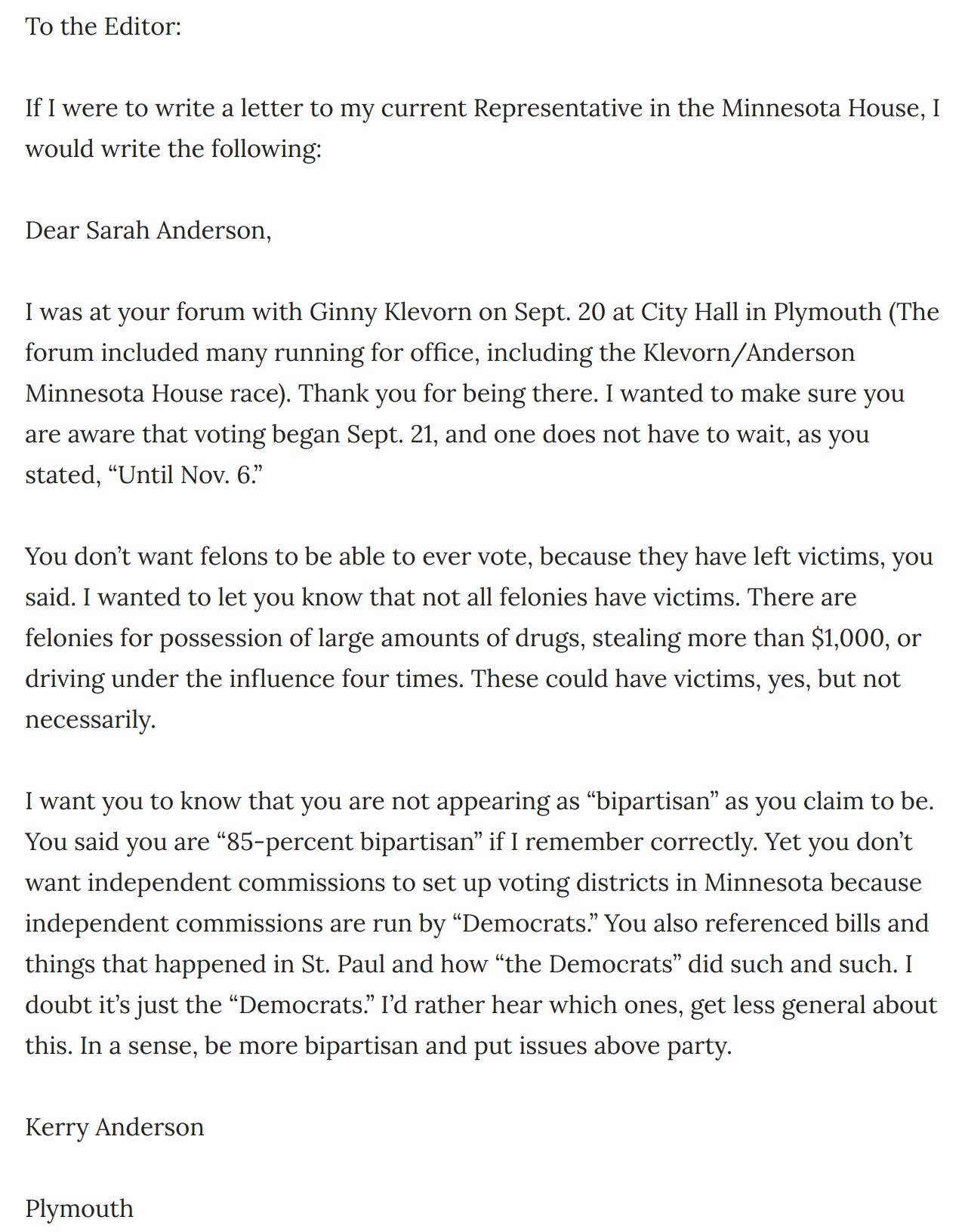How to write a Letter to the Editor, with examples
First, ignore the advice of writers. LTEs are not novels, essays, magazine articles, or even blog posts. Most good writing advice does not apply. Overall strategy is more important than exact wording.
[AI generated town crier. We are not sure why he is crying.]
The first sentence
Ignore this most common LTE advice from writers, who might say, “make sure you have a catchy opening sentence, without that, nobody will read it. Work on that for a while.” The writer is actually saying: “I’ve been working on the first sentence of my otherwise completed novel for the last 11 years, but I can’t seem to get it just right, which is why no agent has ever gotten back to me, since we all know they only read the first sentence.”
LTEs are not novels, essays, magazine articles, or even blog posts. Most good writing advice does not apply.
Here’s what your first sentence should be: First. Otherwise, there are no meaningful specifications. People do not scan the LTEs in their local paper, taking in each first sentence, to decide what to read. They may look at the headline, so it is nice if that is catchy, but only some papers let you suggest the headline. People scan the overall letter, not just Sentence One, then dig in to read the details if they find what they are looking for. Or, they just read all of the LTE. They are short, why pick and choose? Some people probably prefer the shortest ones. You can never really tell what they are going to read. There really isn’t a way to shape your letter to be the one that gets picked. Consternation about the first sentence is more of a waste of time than reading this entire three paragraphs about the first sentence.
Respond to something and keep it clean
If you want your letter picked among the gazillion that arrive every day at a major paper, respond to something else in a previous but recent edition of that paper, either an article or a previous letter. If you see something in the freshly published newspaper that you want to respond to, write your LTE immediately and send it in immediately. That may be the number one method of getting it published.
Cite the thing you are responding to, so the underpaid overworked LTE editor’s intern doesn’t have to do any work to run down what you are referring to. When I say “clean” above I do not mean to eschew the prurient, though you should do that too. I mean make sure the LTE you write needs zero editing. The underpaid overworked LTE editor intern then doesn’t have to do any work.
How to get your LTE in your local Pennysaver paper
Send it to them. They will publish it if it is not going to cause them any pain. After you send it in, follow up with an email reminding them that you are available if there are any questions. If your LTE pokes at any local powers (a mayor, or the Republican Party, etc.) be prepared to be asked to tone it down. If that happens, tone it down but be clever with your words to maintain the effect. But, to reiterate: the little local paper wants your LTE because they normally are short of copy and long on space. The big “paper of record” for your area has more LTEs than they can publish.
Strategize at 20,000 feet and with the big picture in mind
An LTE about a current issue is great, and those can be the most important LTEs, but you should also strategize longer term. Get together with a few other folks and work out a plan to have an LTE or two in almost every issue of your local paper, to support certain candidates or certain issues, but generally without mentioning the name of the candidate.
Let’s say you support a subset of potential candidates for re-election in your city or district, and election season several months away, or just beginning. Write LTEs that support the issues and ideologies of your candidates, without mentioning the candidate’s name. No names. Talk about the issues instead. For example, if you support a pro-environment candidate or two that are probably going to run in a given district in the near future, write an LTE like the following one, written by a clever political operative in a district where pro-environment candidates are likely to be running in the next election:
If you support a set of incumbents who do good work and want to express the idea that government can be good, write one like this:
The above and the following example are good government letters, dropped into the LTE stream during a lull in political activity, as part of a plan to support a positive attitude among the electorate.
See how that works?
Don’t use the names of specific candidates running for office
I’m telling you this again because you didn’t listen the first time and I want to make sure you get it. If you mention the name of a specific candidate, readers of your LTE will know that your LTE is a bogus free-media campaign ad. You won’t win votes for your candidates, and you may annoy the undecided weenies that more often vote with their fragile emotions rather than either partisan loyalty or understanding of the issues (the former being what we mostly do, the latter being what we say we do).
There may be a time to “endorse” a candidate, but really, nobody cares about your endorsement. Your opinion about the state of affairs, or the affairs of the state, or anything in between is very valuable and should be expressed in an LTE. But your endorsement of a candidate is not going to help the candidate. Everyone assumes the candidate is your in-law or friend or something. If you want to meaningfully endorse candidates, join an organization that reflects your values and that endorses candidates, and work with them.
Mention the names of elected officials now and then
Despite the advice just given above, you can and should mention the names of elected officials when you have something personal to say. This is not in the context of elections. These are not candidates that you are mentioning (though of course they may run for office next cycle). This should be done PRIOR TO election season.
If you don’t have something personal linked to your favorite elected, go get one. Attend a town hall and write a letter about the cool thing the elected official said. Read the elected official’s newsletter and respond in an LTE. Pick up on an article in the paper about something your local or state government is doing that mentions the elected.
These can be positive things or negative things, but in all cases, these are potent springboards for an effective and meaningful LTE.
In my own experience, I’ve written public letters of thanks when an elected helps me out, and I’ve written public letters of outrage when an elected goes after a person or group that they should not be bullying. But I avoid naming names during election season. Why? See above.
Example of a letter extolling the virtues of an elected that we want to support in a future election:
Example of an LTE that does not extoll the virtue of an elected:
Example of an LTE that magically does both:
The Main Rules for getting your LTE published
Rule 1: Write it.
Rule 2: Send it.











